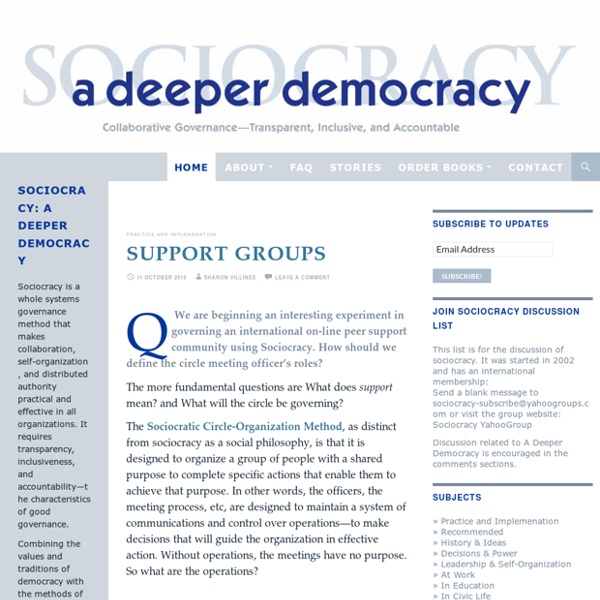



Sociocracy in Action A New Power Structure For Ethical Governance Sociocracy is a method of governance that ensures inclusiveness, accountability, transparency, and productivity. It creates a structure that both involves all members of the organization in policy decision making and produces a strong and efficient decision-making structure. Sociocracy is rule of an organization or government by the "socii," that is, people who regularly interact with each other and have a common aim. In contrast, democracy is rule by the "demos," that is, a collection of people who may or may not know each other and have only general aims in common -- such as the running of a country. An autocracy is rule by an "auto" or single person. The typical business in the North America is an autocracy. Sociocracy can be regarded as a fractal structure.
Sociocratie: La fin du management ? Le billet de ce jour fait suite à de nombreuses suggestions que j’ai reçues de me pencher sur la sociocratie, en particulier suite à mon billet précédent sur l’effet d’échelle. Les articles sur la sociocratie font souvent référence à la cybernétique et aux « systèmes complexes », ce qui a également aiguisé ma curiosité. Il m’a fallu plusieurs mois pour lire une partie de l’abondante littérature et tisser les liens avec d’autres ouvrages ou systèmes de management. Je suis arrivé à une conclusion, plutôt négative, que je vais vous livrer autour de trois convictions : La sociocratie combine un ensemble de valeurs, diagnostics et pratiques qui correspondent bien aux enjeux du 21e siècle, mais c’est une approche contraignante et qui est en conflit sur plusieurs points avec les valeurs du « lean » ou même de l’entreprise 2.0 que je défends par ailleurs.La sociocratie n’est pas une architecture organisationnelle scalable.
6 Of The Best Pieces of Advice From Successful Writers I’ve been reading some advice from successful writers lately and exploring what their routines are like to see what I can learn about Here are six of the most common pieces of advice I came across that have helped me a lot improving my writing here at Buffer. It also features actionable tips for you on how to implement them in your own writing. 1. I write because it comes out — and then to get paid for it afterwards? Unlike Charles Bukowski, writing well doesn’t come so easily for a lot of us (including me). The pure effort of writing is hard enough, but coupled with the pain of putting your work out into the world and letting others judge it, this can be enough to stop you from getting started at all. The trick to overcoming this isn’t easy, but it’s surprisingly effective: give yourself permission to write badly, and just start. Anne Lamott, author of Bird by Bird wrote an excellent essay on why writers must start with horrible drafts: (Great infographic from Copyblogger) 2. 3. 4. 5. 6.
Laird's Greatest Hits — Ecovillage Education US JULY 9th, 2014: Consensus 101 Making decisions by consensus is an unnatural act. At least it is for people raised in a hierarchic and competitive culture--which is just about everybody. We'll go over the cooperative roots of consensus and explain why it requires unlearning old adversarial responses in order to succeed. We'll go over the essential ingredients of consensus, explain blocking and standing aside, and make the case for why it's the most efficient form of decision making, once you've learned how to do it well. JULY 16th, 2014: Conflict: Fight, Flight, or Opportunity? Does conflict mean your group is sick, or just paying attention? JULY 23rd, 2014: Membership: questions you should have asked before joining JULY 30th, 2014: Navigating the Swamp of Non-monetary Contributions by Members to the Group This is the single most commonly requested topic I’m asked to help groups figure out—because it’s messy. Good meeting facilitation can make the difference between pain and gain.
Sociocracratic Resource Circle Twin Oaks' Sociocracy Homepage "Even though we call ourselves democratic, we still make and obey authoritarian decisions, we often allow ourselves to be led by religious faith and superstition and in many situations, even when far-reaching decisions are involved, we follow the dictates of our instincts, our intuition, our premonitions, feelings, fears." We seem to rely on reasonableness, diligence, honesty, and, above all, solidarity of our fellow humans, but people are also uncaring, idle, and unreliable egotists. More than guaranteeing the familiar tolerant attitude to minorities and individuals who deviate from the norm, we must systematically guarantee optimum tolerance for each individual and group when establishes rules for decision-making. And that guarantee comes from.... The previous three paragraphs are quoted and paraphrased from Gerard Endenburg's book Sociocracy: The organization of decision-making .
Centre Français de Sociocratie Ideas para ser más productivos en la gestión del email El correo electrónico sigue siendo una de las principales vías de comunicación que utilizan los usuarios; de hecho, para muchos profesionales es una de sus herramientas clave dentro de su jornada laboral. Si bien es cierto que el email es una herramienta fundamental, también es una de las más odiadas por los usuarios y puede llegar a provocar cierta ansiedad cuando no somos capaces de llegar a vaciar nuestra bandeja de entrada (inbox zero). Teóricamente, el email es un medio de comunicación asíncrona; es decir, el destinatario de un mensaje no tiene por qué contestar de manera instantánea. Sin embargo, la dinámica del día a día nos ha llevado a una serie de malas prácticas que han convertido el email, casi, en un chat y esperamos respuestas instantáneas y sin demasiada demora. ¿Y existe otra manera de gestionar el email? No seas un esclavo del email Para empezar, creo que lo primer que tenemos que dejarnos claro es que tenemos que dejar de ser esclavos del correo electrónico.
SocioNet — Network for a Sociocratic Society sociocratie Sociocratie Management-Issues | News, advice, opinion & resources about the changing world of work